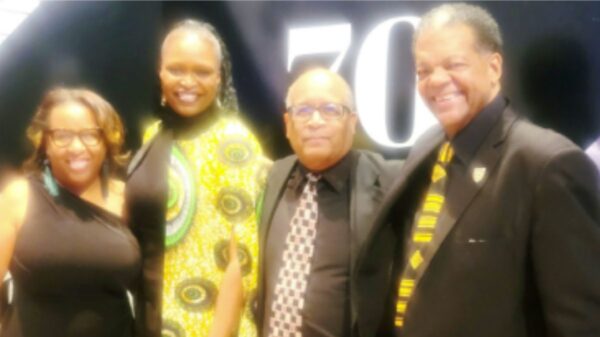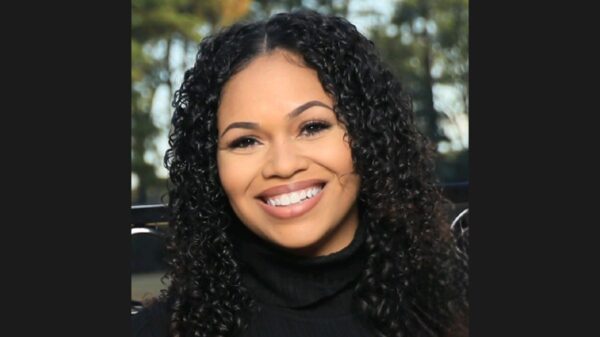By Eva D. Coleman
Lifestyle & Culture Editor
Authenticity and practicality are evident in AKA South Central Regional Director Shawn E. Simmons’ leadership style


Several hundred members of Alpha Kappa Alpha Sorority, Incorporated filled the ballroom at the Omni Hotel in Frisco, Texas on Nov. 2, 2024 for the Northeast Texas Cluster Retreat. It was the first area retreat under the direction of newly minted South Central Regional Director Shawn E. Simmons. Two members in conversation at one of the many numbered tables expressed shock at the conclusion of the event.
“Is that it? Are we done?” The first sorority sister asked.
“I was prepared to be here until five o’clock!” expressed the other.
It was shortly after 12:30 p.m. when Regional Director Simmons wished everyone well, encouraged all to get their boxed lunch and stay, or be on their way. For almost everyone in the room, it was the initial foray into the workings of the “Keeping It R.E.A.L.” administration.
In our Texas Metro News one-on-one conversation with Simmons the previous day, we learned new means of doing business were on the way.

Eva D. Coleman (EC): Did you ever imagine you’d be in this particular spot, as Alpha Kappa Alpha Sorority, Incorporated South Central Regional Director?
Shawn E. Simmons (SS): No. For me, it’s always just been about being at the right place, right time and serving where you are. I talk about, you know, you can’t lead where you haven’t been. So, I think every leadership opportunity, whether it was serving on a committee, leading the committee, leading x, y, z office, right? All those experiences contribute to where you are today. So, I think it’s, again, situations like, when you’re in that moment or in that spot or in that position, you do a good job in that position. And then, it just, it opens the doors maybe for other things, but, you know, 10 years ago, 20 years ago, nah.
EC: You were born January 1st. You’re a New Year’s baby. That beginning signifies something. I know you have a REAL acronym concept. What beginning does it signify?
SS: You know, I’ve often said that this REAL administration is about real people, real service, real issues, but also, real responses to that; and us coming together and understanding, ‘Look, we’re all human.’ We all have our items that we bring, the baggage that we bring, but we’re going to understand that and we’re going to work with that. We’re going to listen to our members or listen to our constituents and respond to that. And so, that’s going to be demonstrated by the meetings, the agendas, the things that we do differently, the innovations that we’re bringing. And so, while REAL has an acronym and it stands for something, the concept of the REAL administration is being compassionate, understanding our members and responding to that. You know, a little bit of a mixture of the tradition but also making room for innovation and room for new ways of doing things and asking ourselves, ‘Well, why do we do that?’ You know, or, ‘Does it take all of that?’ You know, ‘Does a meeting have to go until 5 p.m.?’ And so, I think what members will see at this particular cluster is our goal, and our last cluster we got out at 12:30 because people have real lives. They have real things to do. So, in keeping with that, we’ve adjusted our agenda. We’re listening to our sorors and what they need to be able to show up fully, and you’ve got to be flexible with them, you know? So we’ll have some time for people to connect, get the information that they need, and those who need to go, guess what? Love you, drive safely. And then, we’ll have some time for those who do have more flexibility to connect at the end of our cluster meeting.
EC: That’s a very systematic approach. You have an extensive background in engineering. It involves systems, etc. How much does it play into your approach to leadership?
SS: A lot! I’m real big on processes, efficiencies. But, I often say that, it’s the people who drive the processes though. I never forget making sure that we have that people and person connection. But, our processes are supposed to help us. And so, I am very process oriented, very organization oriented. We’re going to set up the vision, we’re going to set up the framework for things. And then, we’re all going to fall in line. I was telling the team the other day when we were meeting, I said, ‘Lanes are okay.’ Because you have your lane that you’re good in and you can see what everybody else is doing. ‘Silos are not okay.’ And so, every process, every system that’s put in place is good, as long as we don’t fall into those silos. Because silos don’t allow us to understand how what we’re doing affects the other person.
EC: They lead to roadblocks.
SS: Yes. So, lanes are okay. Silos are not okay. But that goes back to those processes though, because if everybody is doing their part, right, it remains efficient, it stays fun. There’s a certain amount of calm in having a really well-run process. People can enjoy it. So, the processes don’t stand alone. They’re done with our people in mind. So, always having that integrated approach, that’s one of the things I think that I’ve learned from engineering, that it’s okay to have a system or a process, but it has to be done for the benefit of the people or the problem that you’re trying to solve. So, I always make sure that you’re going back to solving the problem and not just putting a system in place, so it’s that balance.
EC: Our international president, Danette Anthony Reed, is the first engineer to serve in that capacity and then you having your engineering background, STEM girls are rocking it! Some careers, some still feel are unattainable for women, or there’s a hesitancy sometimes.
SS: I think STEM careers are definitely non-traditional and it goes back to, ‘If I can see it, I can be it.’ So that’s one of the things that’s really important, to make sure that we’re visible role models to those Black and brown girls who, ‘I think I’m interested’ or ‘What exactly do you do?’ And, we try to make it, you know, fun and attainable, like you said. And so, having that visibility, and I try to make sure everybody knows that, ‘Yep, I’m an engineer’ and not a boring engineer. I try to be a fun, dynamic individual, just myself. And, that kind of goes back to that whole REAL administration. I’m going to always try to be that person that I am. I have that right brain that wants a display, but I’m also creative and fun and I think that healthy balance is what makes us who we are.
EC: There’s a Pinky Promise for undergraduates. Tell me about that promise.
SS: It’s really based on a conversation that I had with my daughter.
EC: Your legacy.
SS: My legacy. She’s a Spring ‘21 initiate. And, I remember calling her and saying, ‘You know, I want to understand more and I want to listen more.’ Because, our relationship required me to really understand the art of listening. Not just hearing, ‘Oh yeah, okay babe, un huh’ but like, really listening to understand where the challenges that this generation is going through. And, I assumed that I knew, or I assumed that, ‘Oh, it’s gon’ be fine, oh girl just toughen up.’ But, I realized and learned, through our relationship, that the environment in which our young people are growing up is a lot different from mine. So that Pinky Promise, you know, we were thinking of different acronyms and whatever. It was a ‘What’s up, so the U-P up was Undergraduate Promise, and she said, ‘No Mom, not just a promise, a pinky promise.’ And so that’s kind of how we came to it. So the Pinky Promise had to do with my commitment to really having a mindset that leaned in and listened. So, you know, promise to listening, but not just to hear but to really understand, try to understand, you know, what perspective they were bringing. It was a promise around being a regional director for everybody. Not just the graduates, right, but it’s the undergraduates, the graduates, the general members, those who went to HBCUs, those who went to PWIs; it’s a full, holistic approach. It was to have that mutual respect. There are lots of issues that come up in undergraduate chapters, and you have to balance between letting them run their chapter and have an opinion and have a voice and a vote. And that was very important to me because, I think, a lot of times the perception is, ‘Oh, just do what you’re told. Just do what you’re told. This is how it’s going to be because I said so.’ And there are some instances where it has to be, ‘Hey, cause I said so.’ But that’s not where I was going to start from. I was going to start from a point of, ‘Hey, let’s hear each other. Let me stop and take a pause and really hear your concern, and make sure that you understand that your voice is valued.’ So that was part of the promise. And then, to give support, to try to connect our young people. Look, when they’re getting ready to graduate, and they need connections to jobs, internships, decisions about graduate school. How can I help make those connections and those collaborations for those who may need a little extra help? One of the things that we’ve been able to do at this cluster, for this cluster series, and hopefully we can continue to do it, we have reduced registration for them. You know. So, we’re trying our best to hear, listen and respond appropriately, so, when we can give our young people a little break, we’ll try to do that.


EC: I’m sure they appreciate it.
SS: So that’s what the promise is about. Again, just trying to understand.
EC: We hear you. We see you.
SS: Yeah.
EC: We’ll respond. Responsive is…
SS: Responsive is the “R” in REAL.
EC: We’ve talked about a lot of things. Engineering, etc. And girls, we can be anything. Even President of the United States! Sometimes, some sorority sisters question the relevancy I think, sometimes. What would you say to those…and a lot of times, I believe, it’s from poor experiences.
SS: You mean the relevancy of Alpha Kappa Alpha?
EC: Yes, Alpha Kappa Alpha. And there are just a multitude of things to be a part of. Again, there are some people that have an adverse experience. What would you say to them to kind of let them know ‘We’re still good’ and welcome them back into the fold?
SS: You know, I actually had a conversation with somebody a couple of weeks ago, and I said, you know, ‘Whether somebody is a member or not, whether you have a positive experience with them or not, we still have a responsibility as members to protect our brand.’ And our brand signifies people who are responsive to the community, responsive to each other and at the end of the day, are kind. They’re just kind people. And, you know, the old days of just please and thank you, like back to basics, we need a little healthy dose of that. And so, in terms of being relevant and how to maybe respond to somebody who’s had a negative encounter, I would say, you know, everything starts with us. So we have to do the work of self assessment and what can we do differently, right? And, the thought is if everybody is doing their self assessment, and doing their part to make the change, then the collective body will also change.
EC: Okay.
SS: And we need everybody’s talents and everybody’s voices. And so for us to remain relevant, and for us to be able to pivot and stay with the times, I need your skill, your experience, you know, your perspective. It won’t change if you’re not part of the change, if you’re not part of how we flex and pivot. And so, yeah, it’s easy to be on the outside saying, ‘Yeah, you know, I don’t have time for that.’
EC: Renounce this. Denounce that.
SS: But if you’re a part of, ‘Hey, how can we change?’ Cause a culture isn’t changed overnight. And, it’s not easily changed. But if everybody is doing their part, then you certainly can have time. And I jokingly said to my chapter, I said, ‘Hey, it’s time for the revival.’ It’s time for the REAL revival. And revival means that there’s something in you, right, that inner, inner core, that spirit that just says ‘That’s really what’s important. That’s really what’s relevant.’ I believe that as we begin to interact with each other and people see the desire and the atmosphere and the environment that’s created with this administration, that they will get on board with the revival and they’ll do the things that they need to do to encourage that.
EC: Awesome. So, how many months in so far?
SS: Three. Four.
EC: Three to four months in. Does it feel like two years? (Laughing)
SS: It definitely feels like more than 90 days.
EC: What would you say is the most common inquiry that you get from members?
SS: When is the regional conference? (Laughing) Everyone wants to know the regional conference dates.
EC: Everyone wants to know the dates. Yep.
SS: Yes, actually that is the most important. Second, I think a lot of people ask me, ‘Hey, are you okay? How you doing?’ Which is very much appreciated. Because I think they recognize that you don’t just… it’s not like a switch gets flipped. I wish it was that easy. So, yeah, that’s been a very common question, ‘Hey, are you okay? What can we do to help?’ And that’s very refreshing.
EC: That’s very refreshing. It says a lot. Kind of, people first.
SS: Yeah.
EC: I’ve been a member of the organization for 32 years and I know the undergraduate experience and the graduate experience and I look around the room sometimes and I see the amount of love in the room. When you think about your love for Alpha Kappa Alpha, what are some moments or instances that come to mind that say, ‘I love it here’? At least give me one or two.
SS: The first one that came to mind was when I went to an ME (Membership Experience) initiation, and I realized that in the room was a young lady that I’ve known for years. And, her mom and I were in a Jack and Jill chapter together. So, just, the little ones, the little kids that we used to interact with on other things have now become members of the sorority. That’s pretty neat, right? Because it says something about either there were AKAs in their lives that were an influence, whether it was a parent, and in some cases it wasn’t, it was just people that we knew. I can think of young people over the last five years plus, and since my daughter has gotten initiated, that there were these young ladies I have known for years who we’re now welcoming into the organization. And that’s truly what it’s about, right? Cause if you’re doing it right, you’re having an influence on them. Why wouldn’t they want to become a part of the organization where there was a positive experience that they had with somebody.
EC: And that was long before AKA. They’re watching.
SS: Yeah. Maybe they saw you at school, at Jack and Jill or some event. Even my daughter, the people she went to high school and middle school with, and then fast-forward, they’re like, ‘Oh, I know you don’t know me but I went to school with your daughter. I was in middle school…’ and I’m like, ‘Okay,’ so those are some really good…that makes me smile.
EC: That makes you smile.
SS: I think, another one I just thought of. So, my graduate advisor lives in San Marcos, Texas. I went to the University of Oklahoma. We still keep in touch. And when I see her, it just reminds me all over again, that’s the kind of relationship you want. Here’s this lady who is not related to me at all, but has such a positive influence on me and over the years, still kept in touch with me, still, ‘Hey, you doing okay? Are things good?’ checking in. And I call her my “Sorority Mom” because my mother is not a member of the sorority, but she’s my sorority mom, and when I saw her at my last cluster, you know, just to get that hug, and she can’t be more than 5 [feet]… she’s a little, but she’s a powerhouse; to get that hug, to get that text message, to just get that check in every now and then, those are the good stories. Those are the good reasons why you say, ‘You know what? I love this sorority, and I love everything about it.’
EC: We’re here in Dallas, well Frisco, north of Dallas, for the Northeast Texas Cluster. How many women are expected to be here?
SS: Over 800. I don’t know the exact number, but it’s well over 800 and we’re excited. Even up to the point where we were getting last minute, ‘Oh please can we register’ and I was like, ‘No more. We can’t take anymore.’ But, excited to be here. I have a lot of friends in the area. So, when I went to OU, there were a lot of people from the Dallas area who went to OU. So, a lot of my Kappa Psi, University of Oklahoma, sorors are around and will be here.
EC: Right. A lot of them.
SS: Yes. That’s something to look forward to. You know, it’s Texas!
EC: Right! So how many clusters have already taken place?
SS: So, two clusters, one meeting. So again, it’s innovation. We piloted a combined cluster. So we had our West Texas / New Mexico and our Southwest Central Texas; they were the two clusters combined in one meeting. So we had that October 19 so this is the second one. And then we have three more to go. Next week we’ll have the combined cluster with North and South Louisiana together in one meeting, so the first time that’s ever been done. And then we’ll have Arkansas and then we will end at home in the Houston area with the Southeast Texas Cluster.
EC: Wow. So that’s an innovative approach or evolution. So why combine?
SS: Yeah, just trying to see where we can combine, see there’s some efficiencies, some scaling can be done in terms of meeting, meeting costs, and quite frankly, time. I mean, seven meetings in seven weekends is quite a lot to ask, not only for myself, but for those who are helping to put this on and for those who, again, it goes back to look, we’ve got real lives, real timetables, real things going on. And so, I said, ‘Hey, let’s try to combine a couple of these and just see how it goes. Lessons learned. If it doesn’t work, next year we’ll pivot and do something different. But the feedback was pretty good.
EC: Now, was this a REAL solution that you came up with?
SS: (Nods head) Yeah. Our West Texas / New Mexico cluster is quite small. It’s quite small, usually less than a hundred. And so, the time and effort to put on a cluster, you know, there’s still these fixed costs that you can’t get around. And, for a hundred people to sustain that, it was quite difficult. So, we, look, my engineering, I plotted all of the chapters in those two clusters on a map. And then I said, ‘Okay, what is the most centralized major city out of all of them?’ And, we had a choice between Austin and San Antonio. So, we had just come from Austin for regional conference, so we chose San Antonio, which ended up being very good and we ended up at one of the local HBCUs and, really honestly, gave us a lot more flexibility and it felt really good to be on an HBCU campus.
EC: How many people attended that combined one?
SS: That one was a little over 300.
EC: It was the two smaller ones combined. Again, efficiency.
SS: I think our planning basis, we thought around 400. So I think we came in at about 350 which wasn’t bad in terms of data trends.
EC: What do you hope sorors take away from the cluster experience?
SS: You know, it’s about really, getting the information, so there’s going to be presentations on programs, on our connections and social action, as well as sisterly relations. So, really getting something out of those. And then, making the connections here and really just enjoying the fellowship and the camaraderie, and hopefully getting a little bit more of a sneak peek at who I am and what the REAL administration is all about.
EC: So, the REAL administration. The letters stand for?
SS: It’s Responsive, Empowering, Authentic and Lifting.
EC: What does Lifting mean?
SS: So just, kind of, lifting each of us to that level of being able to connect with each other, giving individuals opportunities to lead, giving us the tools that we need to move forward. But just kind of having fun along the way. Laugh a little. Don’t take things so seriously and so personal all the time. It should be fun.
EC: I see lifting as elevation. Lifting people up and being more realistic.
SS: I want people to feel like you can reach out and touch me. We can have real conversations. Even disagreement. Now, we’re gon’ keep it respectful. But, I’ll be the first one to say, ‘You know what? I messed up on that.’
EC: Accountability. Holding yourself accountable.
SS: Even in the planning of cluster, you know, I had some moments where I didn’t do as good of a job as I could have in terms of communicating my vision and what I wanted. But I had to own up to that. I couldn’t ‘He say, well he said, and she said and you didn’t do,’ no, unh unh. I could only take accountability for what I didn’t do. It starts with me. So if I can remove ego and bias and all that, then I think people, people can get behind that. And they know that when I say, ‘Hey, I apologize. I missed that. That’s on me.’ They know it’s genuine. Okay, she really is sorry. She really is apologizing. And I see that she’s doing the things to try to do it differently, communicate it differently.
EC: It starts at the top. It’s the top down, making other people more comfortable in owning up to their own flaws and mistakes.
SS: It’s not easy sometimes, you know. It’s not easy to make hard decisions. But it’s also not easy to say, ‘Yeah, that was me. I messed it up.’
EC: So far, in your 90 days, what would you say has been maybe one of the hardest decisions you’ve had to make?
SS: Oooh. Oooh. (Clears throat). Probably, the hardest one has been around our membership experience. You know, there are certain factors in being able to extend membership or not. Giving grace where you can, but there have been some hard decisions where I had to hold the line in terms of an undergraduate chapter’s vote. Or, a timeline that just didn’t allow flexibility. I just couldn’t give any more time to rectify something or correct something or… you gotta hold the line. And that’s hard. That’s hard because I understand certain circumstances. So yeah, that’s been hard. I don’t like telling people ‘No.’ I don’t like disappointing people. But at the end of the day, I’m accountable, and I have to make the rough decisions.
EC: Even when the tears come.
SS: Oh boy, those are the worst. But I think what people don’t understand is when I get off the phone or when I get off a Zoom, that I have the tears too, because I don’t like saying ‘No.’ And I understand… (Emotional pause)
EC: I felt that.
SS: But I have a responsibility. And I do my best and I always try to be fair, but you know, when you have to, you have to. And it’s hard, especially when your sorors are involved, or you really feel or you understand the circumstances. But, you just, you can’t. So that part is hard.
EC: Your term goes until?
SS: So it is a two-year term that you can run for re-election. And so, you know, so far so good. I sure would like to make it four years. So, let’s see.
EC: And four years is the max?
SS: Yes.
EC: So, you have your legacy. You were influenced by your aunt. When you look at the sustainability, what do you feel is necessary, that necessary piece to sustain the growth of this organization?
SS: I think it’s definitely a focus on quality over quantity. We gotta get back to the basics. Yeah, it’s the history and the traditions, but it’s also the operational things. Our processes and documents are there for a reason. Like, read it. Know it for yourself. Sometimes we do things because somebody else did it. I’m like, ‘But is that in the book? Is that in the process?’ Because we have our documents, our books, our guides, our processes for a reason. It’s sustained us all this time. And the evolution and the updates and revisions theoretically are there to answer the changes in the environment around us. So the only way I feel like, and I go back to when we were founded and incorporated and all the things that got us here; it’s because we were able to evolve and pivot. But, follow those documents.
EC: Because certain things never change.
SS: Never change. It’s foundational. And we just gotta make sure we understand why we’re doing things. Your motive has to be service and sisterhood, ultimately. The other stuff will come, but if at the core of why you’re becoming a member, whether you’re my relative or not, if at the core of that is not service and sisterhood, then you’re probably wasting your time. And there are other things that you can do.
EC: Plenty.
SS: Plenty of other things. And I tell people, I say, ‘Make sure,’ especially in the case of a legacy, ‘Make sure she want it more than you do.’ And that may be hard, because you really want your baby, your grandbaby, your niece, you know.
EC: You stepped on some… (Taps fingers on table).
SS: Make sure she want it more than you do, because if she does, then she will adjust her actions and she will do the things that it takes to always be a student of service. To always be a student of sisterhood. We’re always learning. We’re always figuring it out. You know, I learn every day. Hey, I gotta pivot. I gotta do things differently, you know. The way I engage this soror is different than how I engage this soror. But because of my love, I’m willing to make those adjustments. Because it’s bigger than me. Everybody can’t float around me. It’s bigger than that. That’s how we sustain it, when we understand and recognize it’s just not us. It’s bigger than us.
EC: This has been amazing to get some more of Shawn Emerson Simmons. Is there anything you would like to add about the organization or this cluster in summary?
SS: I would just say I’m looking forward to connecting with the sorors. Maybe, even offering a bit of transparency that maybe has not been offered in the past, in terms of, ‘Hey, what this looks like.’ I don’t know if I appreciated some of the things that I’m learning about the role and what all happens behind the scenes to be of service. The members are our customers and we want to be customer service focused and so we’re always listening and looking for suggestions of ways to do it better. But at the end of the day, we want to serve, we want to have fun doing it, and look for me with my whistle. I may be blowing a whistle. (Laughs)
EC: Well thank you for your time and spending time with me today with Texas Metro News. We’re really all about uplifting and elevating the Black experience. We do have a high volume of women amongst our readership and viewership so we’re happy to have the opportunity to spend time with you.
SS: Well thank you. I appreciate the opportunity.









You must be logged in to post a comment Login